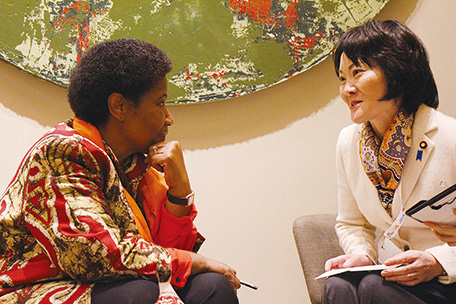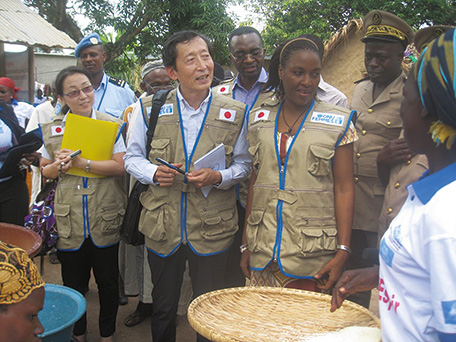(5) Promotion of Women’s Empowerment and Participation
Generally, conventional wisdom and social systems in developing countries are oftentimes shaped based on men’s perceptions, making women prone to vulnerable situations in various dimensions. Compared to the early 2000s when the MDGs were established, girls’ enrolment rate has improved considerably, women’s political participation has increased, and more women hold senior government official and ministerial posts.(Note 15) However, there are still many countries and regions where women continue to lack the same opportunities as men to participate in decision-making processes, which are not restricted to high-level government decision-making but also include family and other private decision-making that affects the lives of women.
Women are critical actors of development, and their participation will lead to not only the improvement of their own lives but also to more effective development. For example, improving the ability to read and write of women who had little or no educational opportunities increases their access to correct knowledge of public health and infectious diseases such as HIV/AIDS, as well as prevention. This leads to proper family planning, and to the promotion of women’s social advancement and economic empowerment.
Goal 5 of the 2030 Agenda for Sustainable Development is “Achieve gender equality and empower all women and girls.” Gender equality (improving unequal relations between men and women), advancing women’s status, and gender mainstreaming* are essential for realizing “quality growth.” For this purpose, it is important for men and women to participate equally in development and to equally reap the benefits.
< Japan’s Efforts >

Parliamentary Vice-Minister for Foreign Affairs Miki Yamada holds a meeting with Executive Director of UN Women Phumzile Mlambo-Ngcuka at the Global Conference on Ending Violence Against Women in December 2015.
In its development cooperation, Japan has made a clear commitment to advancing the status of women in developing countries.
Recognizing women as important actors of development, Japan formulated the Initiative on Women In Development (WID) in 1995 to give consideration to enabling women to participate in every stage of development (development policy, project planning, implementation, and evaluation). In 2005, the Initiative on WID was fundamentally reviewed to establish the Initiative on Gender and Development (GAD), an approach that seeks to realize sustainable and equitable societies. The Initiative on GAD outlined that a gender perspective would be reflected in all fields, including unequal relations between men and women, the disadvantaged socio-economic situations of women, and improving the fixed gender roles and division of labor between men and women, along with the existing focal areas of women’s education, health, and participation in socio-economic activities.
Japan also listed “promoting women’s participation” as one of the implementation principles of the Development Cooperation Charter approved in February 2015, stating that Japan will encourage the participation of women at every phase of development cooperation and be more proactive in ensuring that women share equitably in the fruits of development.
Japan has been offering assistance through the United Nations Entity for Gender Equality and the Empowerment of Women (UN Women) founded in 2011 by merging four parts of the UN system. In FY2014, Japan provided approximately $18.5 million and contributed to efforts for women’s political participation, economic empowerment, ending violence against women and girls, strengthening women’s roles in the fields of peace and security, and enhancing gender consideration in policy and budgets.
Japan considers that sexual violence in conflict is an issue that cannot be overlooked. In this regard, Japan attaches importance to collaborating with the United Nations Office of the Special Representative of the Secretary-General on Sexual Violence in Conflict (SRSG) and contributed $2.55 million to the office in FY2014.
At TICAD V in June 2013, recognizing the empowerment of women and young people as one of the basic principles, Japan announced that it would promote efforts for the establishment of women’s rights and the expansion of employment and education opportunities, working together with African countries, development partners, and others.
In addition, in September 2013, Prime Minister Shinzo Abe vowed to strengthen support for realizing “a society where women shine” in his address at the 68th Session of the UN General Assembly. Specifically, the Prime Minister announced that Japan would implement ODA in excess of $3 billion for the three years from 2013 to 2015 based on the three pillars of “Facilitating women’s active role/ participation in society and women’s empowerment,” “Enhancing Japan’s efforts in the area of women’s health care as a part of its strategy on global health diplomacy,” and “Supporting women’s participation and protecting their rights in the area of peace and security.” In 2014, Japan provided approximately $1.476 billion of assistance over the one-year period.
In September 2014, Japan hosted the first World Assembly for Women (WAW! 2014) as part of the efforts to realize “a society where women shine,” one of the most important agenda items of the government. Japan hosted, WAW! 2015 for the second time, in August 2015, in which 145 Japanese and overseas leaders of various issues surrounding women participated from nearly double the number of participated countries in 2014. Following on from the previous year, the proposal was sent out as “WAW! To Do 2015” (UN document: A/C.3/70/3), a summary of the ideas and proposals from the participants.
When U.S. First Lady Michelle Obama visited Japan in March 2015, First Lady Akie Abe and Mrs. Obama announced that over ¥42 billion of ODA would be implemented over the three years from 2015 for fields related to the empowerment of girls and women and gender sensitive education.
In September 2015, in his address to the UN General Assembly, Prime Minister Abe announced the completion of Japan’s National Action Plan on Women, Peace and Security regarding UN Security Council Resolution 1325. The Prime Minister also expressed Japan’s determination to lead the world in advancing the empowerment and active role of women.
- *Gender mainstreaming
- Gender mainstreaming refers to a means of achieving societal gender equality in all fields. The Initiative on GAD defines gender mainstreaming in development as a process in which women’s and men’s development challenges and needs, as well as the impact of development on both men and women, are clarified throughout the processes of all development policy and intervention formulation, project planning, implementation, monitoring and evaluation, and are based on the premise that all development policies, interventions, and projects impact men and women differently.
- Note 15: Source: The Millennium Development Goals Report 2015
Côte d’Ivoire
Supporting Social Cohesion through the Empowerment of Women Victims of Conflict in the Southern and Western Region of Côte d’Ivoire
Assistance through UN Women (April 2014 – June 2015)

Ambassador Hiroshi Kawamura visits a workshop for processing attieke (a dish made from granulated cassava). (Photo: UN Women)
The western part of Côte d’Ivoire in Western Africa is one of the regions that has been hardest hit by civil war. The influx of refugees and returnees has increased the poverty rate and youth unemployment. Women in particular have fallen into poverty after having lost their job or the head of their household, and they are exposed to the risk of violence resulting from deteriorating public safety.
Moreover, the distrust between ethnic groups, which was exacerbated by the civil war, has become an impediment to the stability of society as a whole. The key to quickly improving this situation is to assist women affected by the conflict in becoming independent and participating in society.
Through the United Nations Entity for Gender Equality and the Empowerment of Women (UN Women), Japan has been providing assistance for income creation activities, social reconciliation and women’s rights awareness campaigns in the three regions of Tonkpi, Goma and Bas-Sassandra in Western Côte d’Ivoire since 2014.
Specifically, 45 organizations (965 people) for women and youth were organized to provide basic equipment for technical training and literacy classes, as well as to conduct assistance for agriculture and food processing industries, which helped to increase incomes. Participants also worked together in groups made up of different ethnicities, which helped to foster relationships of trust among people with different ethnic backgrounds. By raising awareness of women’s rights and social integration, the region is expected to see the greater empowerment of women and improved social stability.
With the assistance of Japan, gender equality is beginning to emerge in Côte d’Ivoire and many other places around the world.
